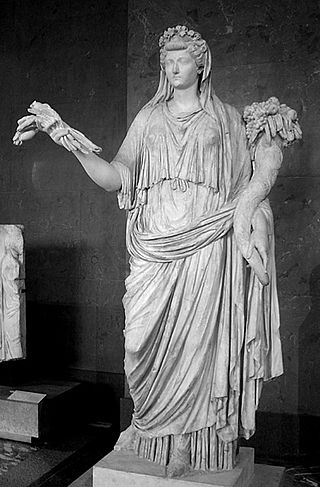Alexandra is a female given name of Greek origin. It is the first attested form of its variants, including Alexander. Etymologically, the name is a compound of the Greek verb ἀλέξειν and ἀνήρ. Thus it may be roughly translated as "defender of man" or "protector of man". The name Alexandra was one of the epithets given to the Greek goddess Hera and as such is usually taken to mean "one who comes to save warriors". The earliest attested form of the name is the Mycenaean Greek 𐀀𐀩𐀏𐀭𐀅𐀨, written in the Linear B syllabic script. Alexandra and its masculine equivalent, Alexander, are both common names in Greece as well as countries where Germanic, Romance, and Slavic languages are spoken.
Ivana is a feminine given name of Slavic origin that is also popular in southern Ireland, France, French-speaking Canada, the Mediterranean and Latin America. It is the feminine form of the name Ivan, which are both the Slavic cognates of the names Joanna and John. It may also be spelled as Ivanna.
Lina is an international feminine given name, mostly the short form of a variety of names ending in -lina including Adelina, Angelina, Carmelina, Carolina, Catalina, Emelina, Evangelina, Evelina, Karolina, Italina, Marcelina, Melina, Nikolina, Paulina, Rosalina, and Žaklina.

Samantha is a feminine given name.
Simone is a given name that may be used as a masculine or feminine name, depending on the language.
Kira is a mostly feminine name of multiple origins and meanings.

Renée is a French feminine given name and surname.
Luisa, Luísa (Portuguese) or Louise (French) is a feminine given name; it is the feminine form of the given name Louis (Luis), the French form of the Frankish Chlodowig, from the Germanic elements hlod "fame" and wig "combat".

Patricia is a gender neutral given name of Latin origin. Derived from the Latin word patrician, meaning "noble"; it is the feminine form of the masculine given name Patrick. Another well-known variant of this is "Patrice".

Gabriel is a given name derived from the Hebrew name Gaḇrīʾēl (גַבְרִיאֵל) meaning "God is my strength". The name was popularized by the association with the angel Gabriel. In some rare cases it can be written as Gabryel.
Pascale is a common Francophone given name, the feminine of the name Pascal. The same spelling is also an Italian form of the masculine name Pascal, and an Italian surname derived from the given name.
André — sometimes transliterated as Andre — is the French and Portuguese form of the name Andrew and is now also used in the English-speaking world. It used in France, Quebec, Canada and other French-speaking countries, as well in Portugal, Brazil and other Portuguese-speaking countries. It is a variation of the Greek name Andreas, a short form of any of various compound names derived from andr- 'man, warrior'.
Adriana, also spelled Adrianna, is a Latin name and feminine form of Adrian. It originates from present day Italy and Spain.

Anna is a feminine given name, the Latin form of the Greek: Ἄννα and the Hebrew name Hannah, meaning "favour" or "grace".

Laura is a traditionally feminine given name in Europe and the Americas, of Latin origin, whose meaning is a metonym for a victor, and an early hypocorism from Laurel and Lauren.
Marie is a variation of the feminine given name Maria.
Gabriella is a feminine given name used in various languages. Its English spelling originates as an Italian feminine given name from the Hebrew name Gabriel. Girls who are named Gabriella often take on a shorter version of the name, such as Bella, Ella, Gab and Gabbi.
Luciana is a feminine given name of Roman origin, a variation of the masculine name Lucius. The name is especially popular in Argentina, Brazil, Italy, Portugal and Romania. In Hungarian language the name is used as Luciána.
Greek name Anna Maria is a feminine given name. In English the name Anna Maria is Annmarie.





